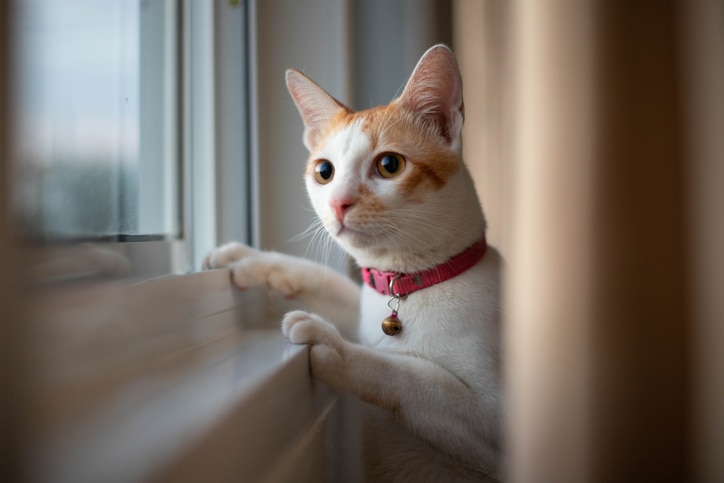Do Cats Get Lonely?

Photo by Arisara_Tongdonnoi/E+
Our feline best friends often keep out of sight—you may even find them in hiding spots, perfectly content all by themselves. But does this mean they don’t get lonely?
“Absolutely, cats can get lonely, despite the common myth that they’re purely solitary animals,” says Cristy Brusoe, a certified cat behaviorist in Tampa, Florida. “While they may not crave social interaction in the same way dogs do, most cats form strong bonds with their humans and even other pets.”
The notion of cats as purely solitary creatures “is a misconception rooted in their independent hunting instincts,” adds Dr. Sabrina Kong, DVM, a veterinarian at We Love Doodles. Unlike dogs, cats don’t rely on packs, but they do form deep social bonds with humans and other animals.
Just like humans, many cats enjoy alone time—especially during the day when they’re sleeping, bird-watching, or chasing dust particles in a sunbeam. But if a cat lacks stimulation or is left alone for too long, loneliness can creep in.
Key Takeaways:
- Cats have a reputation for being solitary, but they can get lonely.
- Most felines enjoy alone time, but they still need mental stimulation and social interaction.
- There are common signs, like excessive meowing, that let you know your cat needs extra attention.
- Cats are mysterious, aloof creatures—and usually much more independent than their dog counterparts.
- But are they really so solitary that they don’t mind being alone? Here’s what’s really happening in your cat’s mind when you’re away.
What Causes a Cat to Be Lonely?
Feline loneliness doesn’t always look like human sadness—it’s often about unmet needs. If your cat is lonely, it’s likely they need more play, mental stimulation, or exploration.
“Chronic loneliness can arise if they’re left alone too often without enough stimulation,” Brusoe explains. This could happen if your schedule changes, they lose a pet companion, or their environment lacks enough enrichment.
In addition to time with you, your feline bestie should always have enriching toys, puzzles, and climbing tools to keep them busy. Even a bird feeder at ground level can do wonders.
Recommended Products
What Are Signs That My Cat Feels Lonely?
Cats can’t say “I miss you,” but they can show it in subtle (or not so subtle) ways. Here are some common signs that your cat needs a pick-me-up:
- Excessive meowing or yowling
- Clinginess or following you constantly
- Loss of appetite
- Overgrooming or undergrooming
- Sleeping more than usual
- Hiding or becoming withdrawn
- Going outside the litter box or scratching on furniture
If your cat suddenly shows these signs, see a vet to rule out medical causes and discuss treatment.
How Long Can You Leave a Cat Alone?
Every cat is an individual. Some are perfectly content with a quiet day alone, while others may miss your company.
So, how long can cats be left alone?
“Most healthy adult cats can manage being alone for a workday or even overnight,” says Brusoe, “as long as they have food, water, clean litter, and enrichment.”
But if it’s more than 12 hours, have a neighbor or a pet sitter check in.
“Automatic feeders and cameras help, but nothing replaces human interaction,” Dr. Kong adds.
Cats are territorial animals and typically do better in their own environment, so hiring a sitter is a wiser choice than boarding if you’re going on a longer vacation.
How to Help Your Cat Feel Less Lonely
Think your cat’s lonely? There’s a lot you can do to help.
“Enrichment is key,” Brusoe explains. “Cat trees, interactive toys, puzzle feeders, and window perches can make a huge difference.”
Toys that mimic prey will satisfy their hunting needs, while food puzzles provide mental stimulation and keep boredom at bay.
Daily interactive play with you is essential, too. Just 10 to 15 minutes with a wand toy can make your cat feel more connected to you and happier overall.
In some cases, adopting a second cat is beneficial, especially if your cat is young, playful, and open to a pal. “Adopt a similar-aged, social cat and introduce them slowly,” Dr. Kong advises, noting that this isn’t the best option for more reserved felines.
Outdoor time can also be enriching, but only if it’s safe. Try leash training with your buddy or build a secure catio to let your cat explore safely. It’s not a good idea to let them roam freely, as they could be injured by a car or predator; plus, it’s not safe for the birds in your area.
If your cat still seems bummed out, a vet or behaviorist may recommend anxiety solutions like pheromone diffusers or an enrichment plan built specifically for you and your cat.
Recommended Products
FAQs About Cats and Loneliness
Q: How do you know your cat is lonely?
A: Behavioral changes are the biggest clues. Watch for excessive meowing, clinginess, increased hiding, litter box issues, or a lack of interest in food or toys.
Q: Will single cats always be lonely?
A: Not necessarily. Some cats thrive on their own, especially if their environment is properly enriched. Others may benefit from having a furry friend. It depends on the individual cat’s temperament and preferences.
Q: Do cats get sad when you leave?
A: Cats may not experience “sadness” in the same way humans do, but they can become distressed, bored, depressed, or anxious if they’re left alone for too long.











